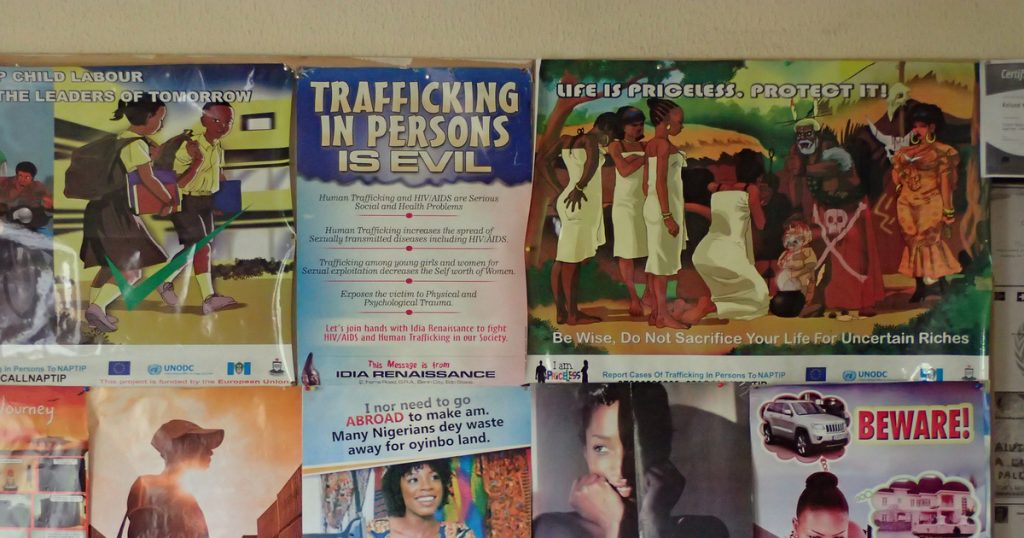Traditionally, when one imagines how someone ends up in slavery of any kind, one sees images of people being forcibly taken from their homes and sent to a foreign country, with absolutely no say in the matter. While this is usually the case in sexual slavery and for other kinds of bondage, it is no longer the case for women from Edo State in Nigeria, that provides 80% of women trafficked into Europe.1 Instead, there is a new phenomenon where women seek out passage to Europe through Madams, knowingly entering into prostitution. This was not always been the case, but extreme poverty, where some even lack running water, this practice has begun flourishing.2

Previously, recruiters lure women with tales of jobs in Europe, working for wealthy families, being hairdressers or nannies, only to find out the harsh reality of forced sex work once they arrived. Eventually, returning with embellished stories of wealth to tempt and recruit women themselves, completing the vicious cycle from victim to perpetrator. Some of the Madams even live in lavish houses, behind gates, as a testament of just what can be earned in European sex work. This show of wealth, in a desperate state, slowly began to transform just how women were recruited into the sex trafficking world.3
More recently, traffickers are being sought out by their victims in hope for a better life for themselves and their families.4 Little do they know of the harsh conditions and abuse they will endure before they can ever return home. After discussion of the “terms” of the work, the women sign legally binding contracts that say they will pay back rent, travel expenses, food, and other miscellaneous expenses, sometimes in a matter of months, sometimes in many years. These expenses total anywhere from 30,000 to 60,000 US dollars, on average. Usually, the women charge 5 to 10 US dollars per client, requiring them to work from sunup to sundown, and sometimes longer.5

Aside from relying on the signed contracts, Madams and pimps use the threat of violence against families, and religion, to keep the women from leaving.6 Using black magic referred to as JuJu, priests perform complex rituals that include eating raw chicken hearts, harm to oneself, drinking cocktails of their own fingernails, hair, and blood, as well as other methods, to bind the women with their traffickers. After completion of the rituals, they are made to feel that death, insanity, or harm will come to their families if they are to break their oath of repayment. A priest, who has benefited greatly from Madams and the pimps he has helped, stated in an interview that the purpose of these rituals are that “she never sleeps well or has peace of mind until she pays what she owes.”7

Furthermore, religion and belief in the negative effects that stem from the severance of the oaths have even led parents to become more complacent and insist that their daughters follow the requests of the people who are exploiting them.8 This, coupled with extreme poverty, exacerbate the growing phenomenon in Edo State, rendering it even more difficult to combat. Though, there are efforts to better the lives of women in Edo State. Education promotes agricultural development and other “basic needs industries,” and is central to the campaigns to inform about the horrors and negative effects of trafficking, and working toward the decriminalization, not legalization, of prostitution to help, instead of punish, those who have been ensnared in a vicious cycle of abuse which is making strides.9
New policies and rules are being implemented and promoted by grassroots organizations, and governments are taking notice. On November 15, 2000, the UN established a “Protocol to Prevent, Suppress and Punish Trafficking in Persons, Especially Women and Children, supplementing the United Nations Convention against Transnational Organized Crime,” which has 173 signatories, showing the world that these malum in se actions have become malum prohibitum or universally illegal, and punishable internaitonally.10 Even with all of these measures, and the recognition of this epidemic at an international level, there are still roughly 4.8 million people (19% of all humans trafficked) enslaved for sexual exploitation in the world, bringing in 99 billion dollars annually (66% of all profits from human trafficking).11 More must be done to end all forms of human trafficking, and it starts with a deeper understanding of the differing local and cultural patterns of recruitment throughout the world. Education and the provision of alternative work options remain the most powerful deterrents.
- Seema Kawar, From Benin City to the Shores of Italy: A New Hub of Human Trafficking, NAOC, (Accessed January 31, 2018), http://natoassociation.ca/from-benin-city-to-the-shores-of-italy-a-new-hub-of-human-trafficking/. ↵
- Abaobi Tricia Nwaubani, Cycle of exploitation turns Nigerian sex slaves in Italy into traffickers, News.trust.org, (Accessed February 12, 2018), http://news.trust.org/item/20161108000327-qfsaw/. ↵
- Abaobi Tricia Nwaubani, Cycle of exploitation turns Nigerian sex slaves in Italy into traffickers, News.trust.org, (Accessed February 12, 2018), http://news.trust.org/item/20161108000327-qfsaw/. ↵
- Abaobi Tricia Nwaubani, Cycle of exploitation turns Nigerian sex slaves in Italy into traffickers, News.trust.org, (Accessed February 12, 2018), http://news.trust.org/item/20161108000327-qfsaw/. ↵
- Esohe Aghatise, Iroko Onlus: Working to Combat the Trafficking of Nigerian Women and Girls Into Italy, Canadian Woman Studies 22, no. 3/4 (2003): 197-199, Humanities Full Text (H.W. Wilson), EBSCOhost (accessed January 31, 2018). ↵
- Esohe Aghatise, Iroko Onlus: Working to Combat the Trafficking of Nigerian Women and Girls Into Italy, Canadian Woman Studies 22, no. 3/4 (2003): 197-199, Humanities Full Text (H.W. Wilson), EBSCOhost (accessed January 31, 2018). ↵
- C. S. Baarda, Human trafficking for sexual exploitation from Nigeria into Western Europe: The role of voodoo rituals in the functioning of a criminal network, European Journal Of Criminology 13, no. 2 (2016): 257, Complementary Index, EBSCOhost (accessed January 31, 2018). ↵
- Abaobi Tricia Nwaubani, Cycle of exploitation turns Nigerian sex slaves in Italy into traffickers, News.trust.org, (Accessed February 12, 2018), http://news.trust.org/item/20161108000327-qfsaw/. ↵
- Esohe Aghatise, Iroko Onlus: Working to Combat the Trafficking of Nigerian Women and Girls Into Italy, Canadian Woman Studies 22, no. 3/4 (2003): 197-199, Humanities Full Text (H.W. Wilson), EBSCOhost (accessed January 31, 2018). ↵
- United Nations, Protocol to Prevent, Suppress and Punish Trafficking in Persons, Especially Women and Children, supplementing the United Nations Convention against Transnational Organized Crime, International Law & World Order: Westons & Carlsons Basic Documents, November 15, 2000, doi:10.1163/2211-4394_rwilwo_sim_033351. ↵
- Human Trafficking by the Numbers, Human Rights First, January 7, 2017. (Accessed February 12, 2018), https://www.humanrightsfirst.org/resource/human-trafficking-numbers. ↵



90 comments
Marlene Lozano
It is sad that human trafficking is still such a big problem. After reading about sex trafficking in Nigeria, I was surprised to find out that Nigeria was providing about 80 percent on the human trafficking that was being sent to Europe. I was also surprised to find out that they would use black magic to bind the women to the traffickers.
Tyler Sleeter
Still a great article. I have become more aware of the problems of human trafficking and sex trafficking lately and it seems to be a growing problem in the world. I am sure it is one of those things that has always happened, but now the world is more aware of it and wants to stop the practice. It is upsetting that these women are bought and sold like cattle for the pleasure of others. It is something that I would expect to be a practice exclusive to men, and was shocked to read that it is often women doing the business. This appears to be one of those crimes that the only way to stop it is to raise public awareness which you have done with your article.
Robert Rodriguez
its sad to hear that even today there is a problem in the world involving human trafficking, specifically sex trafficking. the article gave a lot of information regarding the situation in Nigeria, especially the usage of “Black Magic” which I found to be very interesting that they used that to plant fear in the persons mind. I’m glad that the United Nations and others are doing something to stop trafficking from happening, its something that needs to stop.
Saira Castellanos
I think its insane that people do this. Human trafficking needs to stop, but to do that is so insanely dangerous for anyone who tries to stop it. I am disgusted that i actually intrigued at this kind of article, when i should be more disgusted than anything. I think its ridiculous when people think that human trafficking is not an issue in the world, when it really is a huge issue. Whats more sad is that girls are given away to pimps in order to have a hot meal on their table and roof over their head.
Matthew Wyatt
The practice of sex slavery and human trafficking is an all-to-real and deplorable reality the modern world must address. This article deals primarily with the issue from an African and European perspective, but it’s important to remember that the problem exists in virtually every nation around the globe. As long as women (and some men for that matter) are seen as commodities that can be bought and sold, this cycle of exploitation will continue. Consider giving the article one more close edit, looking specifically at your use of different tenses, to make it even better.
Reese Lujan
Human trafficking is a topic that really makes my skin crawl. It is one of the most demeaning types of punishment that not just woman but men and children go through. It takes a sick monster to really think that is okay. To know that it is not only in the united states but also in Nigeria and probably in other countries.
Maria Esquivel
This was an extremely well-written and informative article. I have never heard of JuJu, so to read that they used black magic to bind the women to their traffickers is really disturbing. It was intense and heartbreaking to read what so many women have to endure daily just to provide and protect their families. I am glad things are being done to end all forms of human trafficking. Great Job, Natalie!
Rafael López-Rodírguez
I really liked this article! This article reminded me of a documentary I saw about human trafficking in the Ivory Coast focused on the trafficking of children. It is very sad how women here had to be seen basically as “sex toys” to be able to provide to their families. It is great that the UN has established policies regarding this matter. Amazing article!
Destiny Renteria
This article was really great, I do wish it had a bit more paragraphs than just one gigantic paragraph since it is a lot of information to take in. Overall still wonderful and I appreciated the fact that black magic was brought into this, because this made a lot of them stay around so they can just live. Not many people will understand these words that you have used and I think maybe you should have used words that were more clearer, because for me I was having a hard time reading and had to look up many things. STILL great, these are just my thoughts. I appreciate your topic on this area.
Timothy ODekirk
Human trafficking, especially sex trafficking is a serious issue and is something that is unfortunately still common to this day. Reading about sex trafficking specifically in Nigeria was extremely interesting to read. Despite being intrigued while reading this article, it is sad to know that something as sinister as human trafficking still exists throughout the country and throughout the world. After reading this articvle about how sex trafficking works in detail, there needs to be something done to stop this horrific issue from escalating any further.